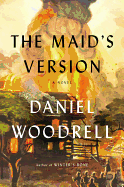
Daniel Woodrell's The Maid's Version is as rich in mountain vernacular as it is in the history and character of a region steeped in rural Americana. Drawing on a locally famous 1929 West Plains, Mo., explosion and fire that killed 39 mostly young ballroom dancers, Woodrell tells a story of tragedy and economic inequality in a small Ozark town. The fictional Arbor Dance Hall disaster "spared no class or faith, cut into every neighborhood and congregation, spread sadness with indifferent aim," but its cause or perpetrators were never identified--except in the settled mind of Alma DeGeer Dunahew.
Alma is the roughhewn grandmother of Woodrell's narrator, Alek, who learns of the tragic explosion and its suspicious origins when he's sent from St. Louis by his father to spend a summer with her in little West Table, Mo. His grandfather was an alcoholic ne'er-do-well who left Alma and their three sons to live off stolen table scraps from the wealthy Glencross banking family, whom she served for half a century as a maid. She entertains him with her version of the "colossal accident, an ongoing mystery she thought she'd solved."
A wonderfully diverse cast plays key roles in The Maid's Version. Alma's promiscuous sister, Ruby, captures Arthur Glencross's heart but dies in the fire; Sheriff Shot Adderly runs the investigation; Preacher Isaiah Willard rails against the eternally damned dancers ("God's wrath will find you even as you jerk about to pagan sounds").
Woodrell doesn't miss a lick in capturing the language of the Ozark hills and the details of its historically hand-to-mouth life. --Bruce Jacobs, founding partner, Watermark Books & Cafe, Wichita, Kan.

